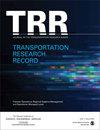Estimating Load Transfer Efficiency for Jointed Pavements from TSD Deflection Velocity Measurements
IF 1.6
4区 工程技术
Q3 ENGINEERING, CIVIL
引用次数: 0
Abstract
Transverse joints are the weakest element of jointed pavements, and when these joints lack structural capacity, the onset of load-related distress is imminent. The most widespread measurement of the joints’ structural performance is the Load Transfer Efficiency Index (LTE), a ratio of the deflection of the two adjoining slabs. LTE can easily be assessed with a falling weight deflectometer, but this test procedure is not advisable for evaluation at the network level because of user safety concerns and because it can be excessively time-consuming. Traffic speed deflection devices like the traffic speed deflectometer (TSD) are suitable devices for network-level pavement structural evaluation. Yet, as of today, no interpretation technique to get structural health metrics for jointed pavements from TSD data has been published. In this paper, a backcalculation scheme based on slab theory is proposed to estimate the joints’ LTE from TSD deflection velocity measurements. The backcalculation problem formulation and its numerical solution using fast procedures are described in detail. The approach is tested with TSD data collected on the MnROAD test track. Overall, it was found that the backcalculation converges to reasonable estimates of the pavement structural properties and can furnish LTE estimates for most transverse joints from 5 cm-resolution TSD data, all at a reasonable computational cost. This allows for corridor-wide LTE assessment of a pavement’s joints using TSD measurements.从TSD挠曲速度测量估算节理路面荷载传递效率
横向接缝是节理路面中最薄弱的部分,当这些接缝缺乏结构承载力时,与荷载相关的损伤就会迫在眉睫。最广泛的节点结构性能测量是荷载传递效率指数(LTE),这是两个相邻板挠度的比率。LTE可以很容易地用下落重量偏转计进行评估,但是这种测试过程不适合在网络级别进行评估,因为要考虑用户的安全问题,而且它可能非常耗时。交通速度偏转仪(TSD)等交通速度偏转装置是网级路面结构评价的理想设备。然而,到目前为止,还没有任何解释技术可以从TSD数据中获得节理路面的结构健康指标。本文提出了一种基于平板理论的反算方案,利用TSD挠曲速度测量值估算节点的LTE。详细描述了反算问题的形式及其快速数值解。采用MnROAD测试轨道上收集的TSD数据对该方法进行了测试。总的来说,我们发现反向计算收敛于路面结构特性的合理估计,并且可以从5厘米分辨率的TSD数据中提供大多数横向接缝的LTE估计,所有这些都在合理的计算成本下。这允许使用TSD测量对整个走廊的路面接缝进行LTE评估。
本文章由计算机程序翻译,如有差异,请以英文原文为准。
求助全文
约1分钟内获得全文
求助全文
来源期刊

Transportation Research Record
工程技术-工程:土木
CiteScore
3.20
自引率
11.80%
发文量
918
审稿时长
4.2 months
期刊介绍:
Transportation Research Record: Journal of the Transportation Research Board is one of the most cited and prolific transportation journals in the world, offering unparalleled depth and breadth in the coverage of transportation-related topics. The TRR publishes approximately 70 issues annually of outstanding, peer-reviewed papers presenting research findings in policy, planning, administration, economics and financing, operations, construction, design, maintenance, safety, and more, for all modes of transportation. This site provides electronic access to a full compilation of papers since the 1996 series.
 求助内容:
求助内容: 应助结果提醒方式:
应助结果提醒方式:


